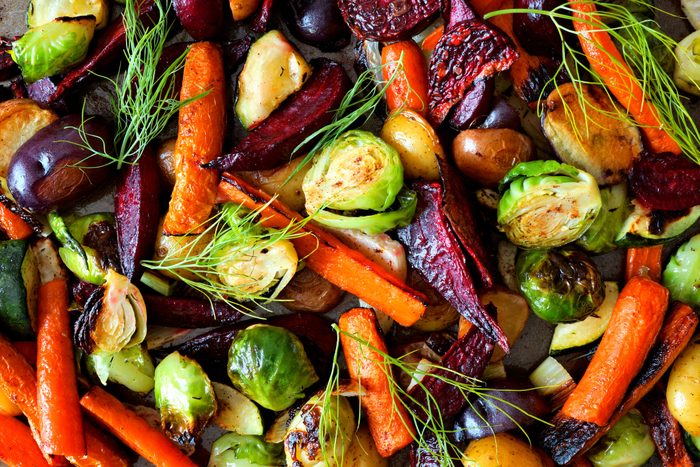
Can I increase my metabolism?
When it comes to weight gain, our metabolism shoulders a lot of blame. Whether we can’t scarf down pizza like we used to or we envy that friend who never puts on a pound, we point to a slow metabolism as the source of our weight problems. Florence Comite, MD, is a board-certified endocrinology doctor (who specializes in the study and diagnosis of hormone function, which dictates weight loss and other processes). Dr. Comite explains: “A slow metabolism expends energy at a slower rate—so if you eat an excess of calories and have a slow metabolism, more of those calories will get stored as fat, and you gain weight … But you can’t totally blame weight gain on having a genetically slow metabolism, as many people do.”
In fact, recent research shows our metabolic rate doesn’t change much throughout our lifespan—it dips slightly between infancy and age 20, holds steady, and then declines very gradually after age 60. These findings suggest that, for the most part, a slow metabolism is a sign that some lifestyle choices are getting in the way of it working at full speed.
This is good news (a relief, even) because when it comes to how to increase metabolism, it’s not about magic pills or drastic diets. Dr. Comite, who’s the founder of the Comite Center for Precision Medicine and Health, and other metabolism experts say you can fuel a faster metabolism with these changes to your lifestyle.
What Is Metabolism? Medical Doctors Explain the Actual Definition

How to increase metabolism
Hydrate
“Staying hydrated is crucial for a healthy metabolism,” says registered dietitian Jessie Hulsey, RD, LD. “Drinking enough water helps your body burn calories more efficiently and can help prevent overeating.”
In fact, because water is so important to the way your body turns fat into energy, research shows that even mild levels of dehydration can slow metabolism.

Don’t crash-diet
Regardless of how fast your metabolism engine is revving, eating too much and inadequate nutrition can result in weight gain, Dr. Comite explains. But over-restricting your diet can have big consequences, too.
Importantly, most fad diets fail because they’re unsustainable in the long term. If you’re not giving your body enough fuel, your metabolism actually adapts down—meaning that if you’re eating less, your metabolism responds by dialing back its efficiency.
Scientists documented this phenomenon by studying contestants from the show The Biggest Loser. All participants made dramatic changes to their food intake, leading to dozens of pounds of weight loss for each. But six years later, the researchers found that most had gained it all back (with several gaining even more), and their metabolism rate remained slower—burning about 500 calories fewer per day than is average for their body size.
This Is What Nutritionists Do When They Want to Lose 5 Pounds

Eat protein with every meal
It may sound counterintuitive, but eating is one of the best ways to speed up your metabolism. “When you digest food, your metabolism increases—that’s called the Thermic Effect of Food (TEF),” Dr. Comite says. “Make sure you eat protein with every meal and snack. Because protein takes longer to digest than the other macronutrients, it revs your TEF metabolism longer.”

Eat more veggies + fruits
“Focusing on a nutrient-dense diet is really important,” says Dan LeMoine, a nutrition consultant who’s board certified by American Fitness Professionals & Associates (AFPA). “All of our metabolic processes start at the cellular level—and if your cells are not getting the micronutrients they need, your metabolism isn’t going to do what it’s designed to do.”
Incorporating more fruits and vegetables into your meals offers a one-two punch for your metabolism because—in addition to delivering a wealth of nutrients—they’re also a great source of fiber. Hulsey says fiber helps you feel full longer, which helps avoid overeating, along with regulating blood sugar levels. The blog for Harvard University’s T.H. Chan School of Public Health says getting enough fiber is also linked with a lower risk of metabolic syndrome, a cluster of symptoms related to metabolism inefficiencies that increase your risk of chronic diseases, like diabetes and heart disease.

Manage the stress in your life
Dr. Comite says short-term stress, like being chased by an angry dog, actually speeds up your metabolism to fuel your body’s fight or flight response. “But if stress is constant and chronic, like from a stressful job or serious health diagnosis, the stress hormones can slow your metabolism by making it harder for your body to use insulin.”
In addition, chronic stress is linked to the accumulation of visceral belly fat, a dangerous type of fat that’s deep in your abdomen surrounding your vital organs.

Weight train
“Along with eating more protein, do resistance exercise to build muscle mass,” Dr. Comite says. “Muscle is more metabolically active than fat, so more muscle means more calories being burned even while you’re watching TV on the couch.”

Sign up for a HIIT class
Cardio plays a role in boosting your metabolism, too, but some forms of cardio may be more effective than others. Dr. Comite points to recent research that shows high-intensity interval training (HIIT) increases the number of proteins in skeletal muscle essential for energy metabolism and muscle contraction and chemically alters key metabolic proteins for the better. Says Dr. Comite: “Other research shows that intense bouts of exercise boost ‘excess post-exercise oxygen consumption (EPOC),’ an afterburn effect where we expend more calories during the recovery period after exercise.”
Get The Healthy @Reader’s Digest newsletter and follow The Healthy on Facebook, Instagram, and Twitter. Keep reading:

